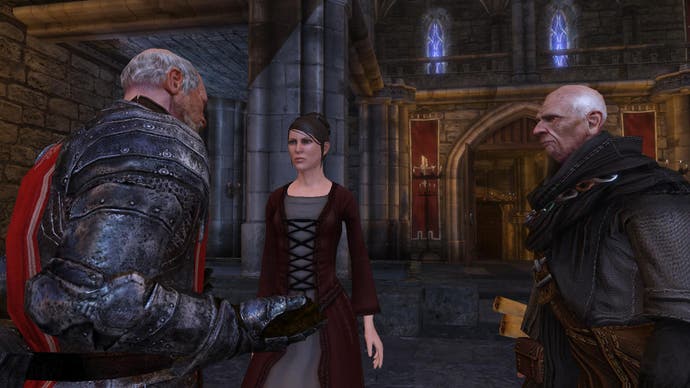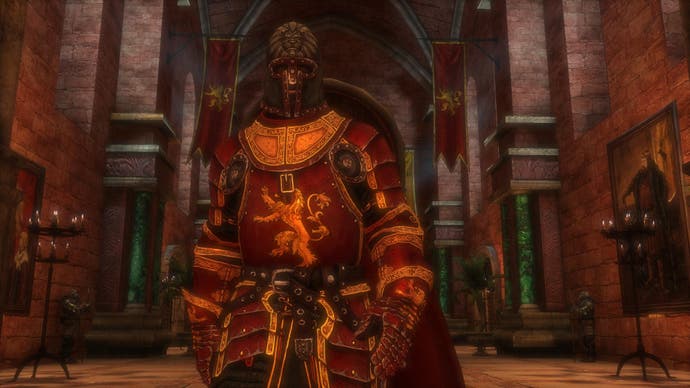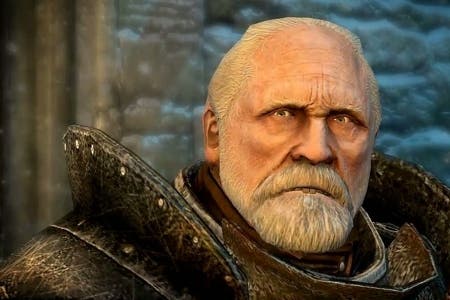Game of Thrones Preview: A Mummer's Farce?
Cyanide's action RPG takes a roll of the dice.
Game of Thrones is a big licence, and without wanting to be unfair to Cyanide, it's been matched with a developer whose stature doesn't quite match up. They're a patchy bunch at best, this French outfit; a handful of years back they delivered a competent if uninspired update of Blood Bowl, and recently they've focused firmly on simulating professional cycling.
While that world is at times full of deceit, double-crossing and dark politics, any comparisons with the mature backdrop of George R. R. Martin's Game of Thrones stop there. It's the kind of fantasy universe you'd imagine CD Projekt, already a purveyor of naughty worlds and nipples in a time of sword and stone, could revel in. Cyanide - whose one other dalliance with the fantasy genre came with the instantly forgettable Loki - though? Not so much.
But Game of Thrones, the developers' second attempt at the licence after last year's well-meaning but ultimately flawed real-time strategy game, sees them trying, and trying very hard indeed. Work's been going on with this action RPG for over three years, starting well before HBO's adaptation turned Martin's series into a broader cultural phenomenon.
Cyanide takes the first book in Martin's A Song of Ice and Fire series as its starting point, though it's not an adaptation - rather, the game flits around the timeline of A Game of Thrones, introducing a handful of characters drawn from Cyanide's own imagination that offer a new perspective on the opening tale of courtly intrigue.

Cyanide's own story is one that it's laboured over, spending a whole year producing a 20-page story outline that attempts to match the standard laid down first by Martin and latterly by the skilled HBO adaptation. Structurally, at least, it's faithful to its source, its two leads sharing a story that's delivered chapter by chapter, cutting between the two perspectives in a fashion similar to Martin's books.
The playable characters, too, are faithful - there's Mors Westford, a member of the Night's Watch who goes into battle with a pup by his side, and he's joined by Alester Sarwyck, red priest of R'hllor. They're both hardened characters with faces and personalities visibly beaten by the hardships of their lives spent in Westeros.
And it's a land that's been approached with that same spirit of faithfulness - we're dropped off initially in Castle Black, a fittingly dark locale that's perpetually in the shade of the Wall, the towering sheet of ice that fortifies the Northern border of Westeros. "When we were working with George Martin, he saw the wall and said 'Woah - it's very, very big,'" says lead designer Sylvain Sechi as he shares an anecdote. "We said, yeah, it's 600 feet like you wrote in the book. He said 'Woah - I wrote it too big.' We're very authentic, and sometimes it's too authentic for him!"
But a spirit of faithfulness can take you only so far, and at times Cyanide's take on Game of Thrones sees a lack of resources and, perhaps, technical ability, rendering Martin's world disappointingly generic. There are moments of mild beauty, such as when Alester attends his father's funeral, taking place under the deep red canopy of an autumnal forest, but it never feels like you're immersed in a dark, fantasy world - rather that you're trapped inside an RPG with middling to low production values.
They're production values that don't exactly help with the delivery of the all-important dialogue, spouted with a kind of starchy, puppet-like emoting. It's dialogue that you play a hand in yourself, and somewhat fittingly the morality your choices embody is an ashen grey rather than a binary black and white, but even the presence of cast members from the HBO series seemingly fails to elevate it to where it should be.
It's dialogue that also branches out and promises to push the story along different paths, although it's part of a strictly linear progression through a tale that will take around 25 to 30 hours to see through to its end. "It's like Mass Effect without the exploration of planets kind of world," humbly explains Sechi. "We decided to make it linear to make sure we could deliver an impactful story."
Such linearity will likely come as a disappointment to those who wanted to explore Westeros, but at least its backbone, the RPG combat, looks dependable enough, and comes with pleasantly aged elements. Alester and Mors are the two stock characters, though both can be set on different ability paths at the outset. You can pick classes - the defensive Landed Knight or the more aggressive Hedge Knight for Mors, for example - as well as assign a selection of passive and active skills.
And in a somewhat charming nod to role-playing games that are acted out via paper and pencil rather than a controller, it's possible to select character traits. You can choose whether to be a born leader or a master of poisons, but each strength must be balanced out with a weakness - being witless, perhaps, or being afflicted with greyscale, the imagined affliction that can slowly turn skin to stone.
Combat itself is slightly more modern, though it still bears a staunchly traditional heart. Commands can be stacked up in an Active Pause menu, while targets can be selected on the fly with the d-pad - so while the action plays out in real-time you're free to step back and tinker with the grander strategy. It's a system that's worked well enough before in BioWare's hands, and there's nothing to suggest it won't be as satisfying once embedded in Cyanide's own fantasy world.

How well it's suited to the world that Martin created remains open to debate, though. Fighting as a red priest, the fire that you can summon that's alluded to as an illusion in the existing fiction becomes very real, dousing enemies in flame and spreading quickly across small groups of fighters - yourself included if you're not quick enough to flee from the chaos you've created.
Cyanide engages some of the more awkward elements of A Song of Ice and Fire too, allowing you as ranger Mors to enter the mind of the dog that's always faithfully by your side. What follows is slapstick savagery, small stealth sections that are directed by your squat dog's sense of scent. It's mildly reminiscent of A Dog's Life, bar the feaces-flinging.
And it gives rise to the feeling that a blunt and sometimes clumsy action RPG isn't necessarily the best of ways to explore this world of courtly intrigue. It's perhaps not surprising, given the developer's heritage, that this isn't going to be an experience on par with The Witcher or Skyrim - Cyanide falls short when it comes to resources and, perhaps, imagination, something I discovered myself when playing through its latest Tour de France game last year. I also learnt that it doesn't skimp on heart, though, and that could be enough to make Game of Thrones an enjoyable if flawed RPG.

